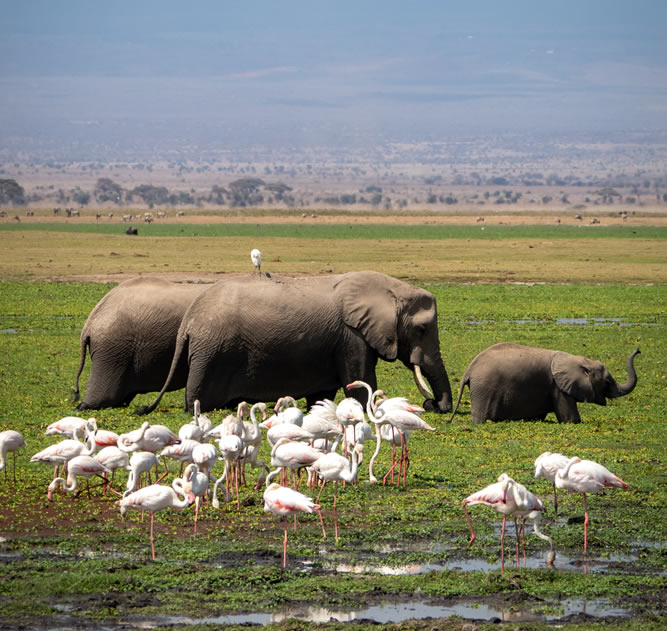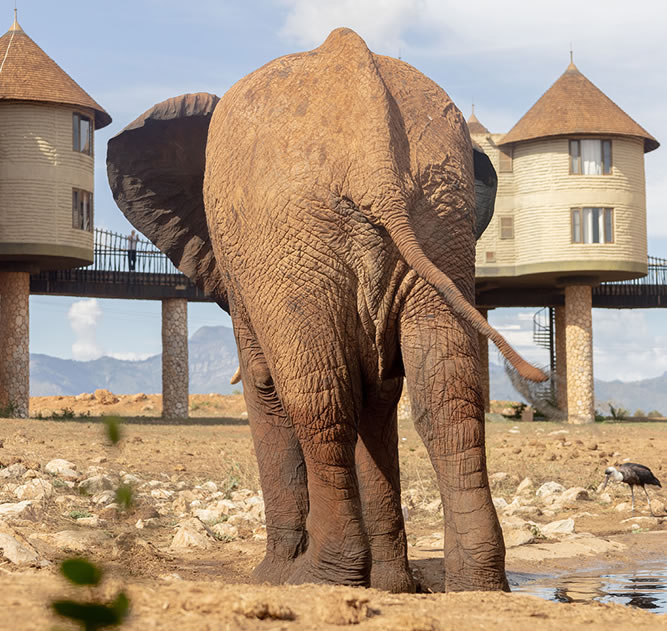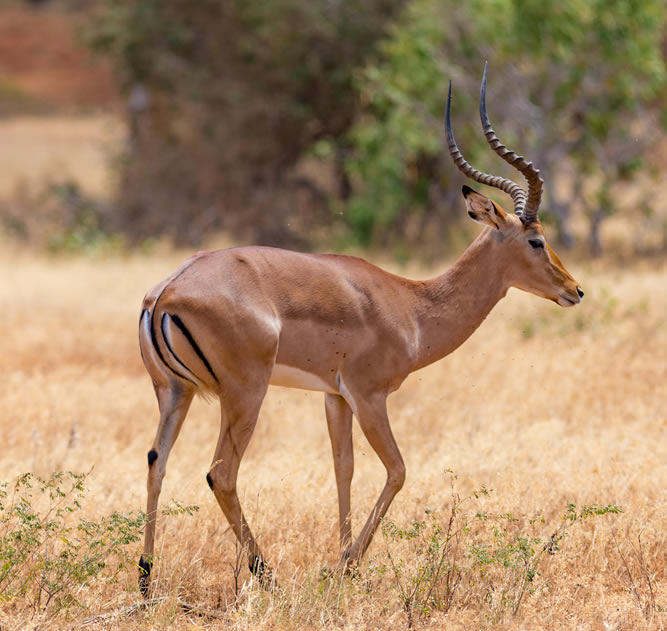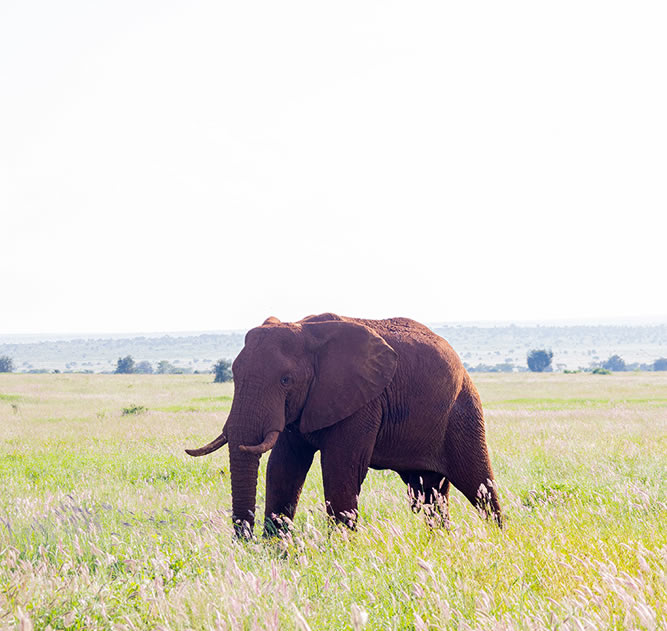



Wildlife Touches Safari
| Days | 4 Days 3 Nights |
|---|---|
| Highlights | Sightseeing Tours, Adventure Tours, Safari Tours |
| Transport | Jeep afari |
4-day safari itinerary covering Tsavo East, Amboseli, and Taita Hills Saltlick Sanctuary — a classic combo for wildlife lovers in Kenya
As your safari begins, you’re welcomed by the fresh morning air, the sounds of birds and distant wildlife, and the sight of a vast African landscape stretching before you.
Highlights:
• Tsavo East National Park: “Red Elephants“
• Amboseli National Park: “Kilimanjaro view”
• Taita Sanctuary: “Community wildlife”
We will pick you up from your hotel or Airport and drive directly to Tsavo East National Park, home of the “Red Elephants” and also the largest National Park in Kenya. On arrival at the first gate we will check in and immediately we will start or first game viewing in the famous park. We will continue with the game drives to reach the Tsavo Sentrim camp in time for Lunch. After lunch we will have some short time to rest before we get back to the park for evening game drives which will take us to areas like the Aruba Dam which is a manmade dam drawing its waters from Voi River attracting thirsty animals which come to take water from it. We also have a diversity of resident bird species which includes hornbills, eagles, kingfishers, weavers, bustards, storks and marabou. As sun is going down we return to the camp for dinner and overnight.
After early breakfast, we will proceed to the world-famous Amboseli National Park. Arrive and check in at Amboseli Sentrim Camp in time for lunch, we will have a short break before we proceed for game drives at the park. This park has a unique panorama of Mount Kilimanjaro and it is also voted as one of the best wildlife areas to observe elephants at close quarters. The incredible abundance of animals at the foot of the highest mountain in Africa is an amazing experience. Have also the chance to visit the observation hill where a very nice view of the park gives you the chance to observe the entire park and see the swamps in the park. After this spectacular safari, return for dinner and overnight at the Camp.
We will do an early morning game drive in the park then come back for breakfast after breakfast we drive to Taita wildlife sanctuary arriving in time for lunch. After lunch and a short rest , we will do game drives in this wildlife sanctuary which is a community based conservation area .Game drives will be extended to Lumo game sanctuary also, this game sanctuaries hosts most of the animals likely to be seen in Tsavo west National park. As the sun is going down we get back to the tented lodge for dinner and over
Early Morning game drives with high chances of seeing the predators while hunting, then back to the camp for breakfast. After breakfast, proceed for a game drive enroute as we come out of the park arriving at a Restaurant outside the park in time for lunch, after which we drive back to your hotel on the coast, arriving there in the early evening.
PRICE INCLUDES
All park entrance fees
All game drives and transfers in a good customary minibus or Land cruiser on safari
Unlimited game drives up to 6pm (sundown)
Breakfast (B) / lunch (L) / dinner (D) as indicated
Accommodation in a double room in mentioned accommodations or similar
Local English speaking driver guide.
Enough bottled water each day
Detailed travel information.
PRICE DO NOT INCLUDE
International flight.
Visa for Kenya (about USD 50)
Beverages
Tips
-Tsavo East National park
-Amboseli National Park
-Saltlick Sanctuary
June to October and January and February
June to October and December to March
April and May
June to October
March, April and May (Peak of the Wet season)
GROUP OR PRIVATE, 4×4 JEEP SAFARI Kwetu Safari Safari Tour features Days 8 Days 7 Nights Highlights Sightseeing Tours, Adventure Tours, Safari Tours…
GROUP OR PRIVATE, 4×4 JEEP SAFARI WILD CHEKERS SAFARI Tour features Days 9 Days 8 Nights Highlights Sightseeing Tours, Adventure Tours, Safari Tours…
GROUP OR PRIVATE, 4×4 JEEP SAFARI True African wilderness safari Tour features Days 9 Days 8 Nights Highlights Sightseeing Tours, Adventure Tours, Safari…
Trustindex verifies that the original source of the review is Google. Trustindex verifies that the original source of the review is Google. Trustindex verifies that the original source of the review is Google. Trustindex verifies that the original source of the review is Google. Trustindex verifies that the original source of the review is Google. Trustindex verifies that the original source of the review is Google. Trustindex verifies that the original source of the review is Google. Trustindex verifies that the original source of the review is Google. Trustindex verifies that the original source of the review is Google. Trustindex verifies that the original source of the review is Google.
Best Memory Safaris operates on excursions and safaris in East Africa. we also offer tailor made tour programs which specially fit your travel plan, including Mountain trekking,walking safaris and Social project visits. Our Kenyan office is located on the South Coast of Mombasa at Diani Beach and managed by a Team of seasoned professionals. We pride over 15 years experience and international class exposure in safari business.
No WhatsApp Number Found!
WhatsApp us